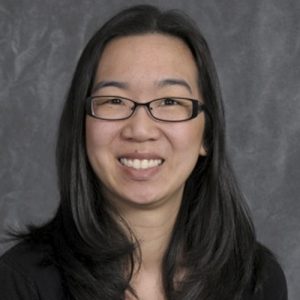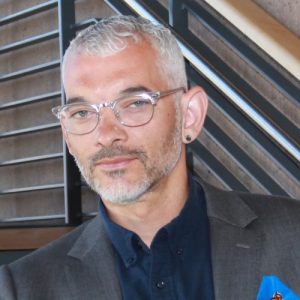UCI Celebration of Teaching Honors Three ICS Faculty Members
On April 21, 2022, UCI’s Division of Teaching Excellence and Innovation (DTEI) recognized faculty, instructors and teaching assistants at its annual Celebration of Teaching event. This year, three faculty members from the Donald Bren School of Information and Computer Sciences (ICS) were recognized:
- Stacy Branham received the Digital Accessibility Innovator Award;
- Jennifer Wong-Ma was selected as a Dean’s Honoree for Excellence in Undergraduate Teaching; and
- Roderic Crooks received an Inclusive Excellence Teaching Award.
At the event, a collection of celebratory videos was presented, honoring these and other outstanding educators at UCI.
Digital Accessibility Innovator
 Stacy Branham, an assistant professor in the Department of Informatics, was recognized (see the video) for her work in digital accessibility. This Campuswide Teaching Award is selected by members of the Academic Senate Council on Teaching, Learning and Student Experience and members of UCI’s Office of Equal Opportunity & Diversity (OEOD). “As a person with an invisible disability and someone whose research is dedicated to digital accessibility, I am constantly seeking new ways to make my classroom just a bit more accessible. But, often, the labor of making an accessible classroom is ‘invisible work’ that goes unnoticed by anyone other than the students who directly benefit,” says Branham. “So, while I am thrilled and honored to be the first recipient of this award, I am more moved by the fact that, for the first time at UCI, there is a campuswide award that signals the value of digital accessibility.”
Stacy Branham, an assistant professor in the Department of Informatics, was recognized (see the video) for her work in digital accessibility. This Campuswide Teaching Award is selected by members of the Academic Senate Council on Teaching, Learning and Student Experience and members of UCI’s Office of Equal Opportunity & Diversity (OEOD). “As a person with an invisible disability and someone whose research is dedicated to digital accessibility, I am constantly seeking new ways to make my classroom just a bit more accessible. But, often, the labor of making an accessible classroom is ‘invisible work’ that goes unnoticed by anyone other than the students who directly benefit,” says Branham. “So, while I am thrilled and honored to be the first recipient of this award, I am more moved by the fact that, for the first time at UCI, there is a campuswide award that signals the value of digital accessibility.”
Branham stresses that you don’t need to be familiar with novel or niche technologies to support accessibility. “The work of making a class accessible is actually much less glamorous and technologically innovative than the award might suggest,” she says. “Innovation tends to be in orchestrating a learning environment where social norms and values support effective use of the basic technologies we’re all increasingly familiar with: Zoom, Slack/Discord, microphones and speakers, webcams, Poll Everywhere/Sli.do, etc. And there’s also an aspect of creating an open dialogue with the students so that you can respond dynamically to their specific access needs.”
Branham offers a hybrid learning environment focused on attention and engagement. “Little things — like checking that the remote audience can hear you, repeating questions aloud so remote and virtual audiences are on the same page, and offering the remote parties a chance to weigh in first — go a long way to creating inclusion,” she says. She shares her slides in advance (to help students who are blind or who have poor network connectivity) and shares a recording of the live lecture (to help students who have chronic illness or developmental disabilities — or the student who got a flat tire on the way to class). She turns on auto-captions to help D/deaf and hard of hearing people follow along as well as people who are English language learners or people in extremely loud or quiet environments. She also provides modality options, so students can provide live input by texting from their phones (using Poll Everywhere) or by responding in the Zoom chat or on Slack.
“Communicating the importance of accessibility as a value within the classroom is critical to building a communal commitment to bringing everyone along,” says Branham. “I notice that when I model disability inclusion, the students follow and contribute to that culture. It’s the good kind of infectious!”
Excellence in Undergraduate Teaching

Jennifer Wong-Ma, an associate professor of teaching and vice chair of undergraduate studies in the Department of Computer Science, was named a 2022 Dean’s Honoree by Marios Papaefthymiou, dean of the School of ICS. She teaches systems and architecture courses, which typically have more than 300 students, and she oversees the undergraduate ICS tutoring program. “Professor Wong-Ma is widely regarded by her students as an excellent and dedicated classroom instructor,” says Dean Papaefthymiou in the video. “She is also an exemplary citizen. During the pandemic, she provided help to other faculty in the school moving their courses online.”
“The pandemic was a catalyst for faculty to communicate their teaching challenges and to leverage the expertise of their peers,” says Wong-Ma. She continues to work one-on-one with faculty and to share best practices within the school. She credits part of the success of her remote courses to the best practices obtained from DTEI’s supportive workshops and programs. “Creating an easy-to-navigate and well-structured Canvas site, along with maintaining regularity within the course assignments,” she says, “aids the students in navigating the course expectations and finding a rhythm for the term.”
Wong-Ma is also a faculty adviser of UCI’s Women in Information and Computer Sciences (WICS) and Commit the Change student organizations, co-chair of the Computer Science and Engineering Steering Committee, and a member of the Women in Technology at UCI (WIT@UCI) advisory board. “I believe my strengths as a teacher are rooted in my interactions with students,” she says. “Having open communication and participating in student events helps me to understand the challenges they face and allows me to place myself in their shoes to grasp their perspectives.”
She is honored to have been recognized by the school for her efforts in teaching. “I feel privileged to work at a university where teaching is recognized and rewarded,” says Wong-Ma, who received her B.S., M.S., and Ph.D. in computer science from UCLA and who taught at Stony Brook University in New York for 12 years before joining UCI. “I love engaging with students as they learn and fostering their curiosity with the material.”
Inclusive Excellence Teaching
 Roderic Crooks, an assistant professor in the Department of Informatics, was one of 11 UCI faculty members to receive the new Inclusive Excellence Teaching award, co-sponsored by the Office of the Vice Provost for Teaching and Learning and the Office of Inclusive Excellence (see the video). Crooks views the award as validation of his INF 161: Social Analysis of Computing course, which he taught in partnership with informatics doctoral students Benedict Turner and Adrianna Burton. “Benedict helped me revamp the course extensively in 2020 and Adrianna also contributed a lot to the content, style and vibe of the 2021 version,” says Crooks. “I share this award with them in every sense.”
Roderic Crooks, an assistant professor in the Department of Informatics, was one of 11 UCI faculty members to receive the new Inclusive Excellence Teaching award, co-sponsored by the Office of the Vice Provost for Teaching and Learning and the Office of Inclusive Excellence (see the video). Crooks views the award as validation of his INF 161: Social Analysis of Computing course, which he taught in partnership with informatics doctoral students Benedict Turner and Adrianna Burton. “Benedict helped me revamp the course extensively in 2020 and Adrianna also contributed a lot to the content, style and vibe of the 2021 version,” says Crooks. “I share this award with them in every sense.”
Crooks says his approach to undergraduate teaching changed in 2020, during the pandemic and the worldwide protests in solidarity with the larger Movement for Black Lives. “I was reminded that our work in higher education must be a project of civic good, including public conversations about racism, oppression and the tech sector’s complicity in state violence,” he says. “Students wanted to talk about sexism in the tech sector. Students wanted to talk about the relationship of computing to U.S. imperialism. Students wanted to know how their work in the tech sector might contribute to the shape of the world.” While he offers no answers to their questions, he acknowledges that education in informatics and work in the tech sector and in academia must include such inquiry. As such, the course tackles questions such as how computing systems replicate current structures used to organize society (such as race, class, gender and sexuality) and helps students analyze technological objects to consider their social and political implications.
“Inclusive excellence is a goal and aspiration, not something we accomplish in one course in one quarter, or even in a single career. We have to continue to think about the world and our place in it,” he says. “But we can use our shared work as a public institution to think and speak meaningfully about what the world we are living in is like, how it got to be this way, and what other kind of arrangements we might like to make.”
He hopes this award signals a commitment from campus leadership to intellectual life in service of a meaningful public mission. “The ideal of the university — to understand the world we live in and to organize ourselves to transform it — is what I understand inclusive excellence to embody.”
— Shani Murray